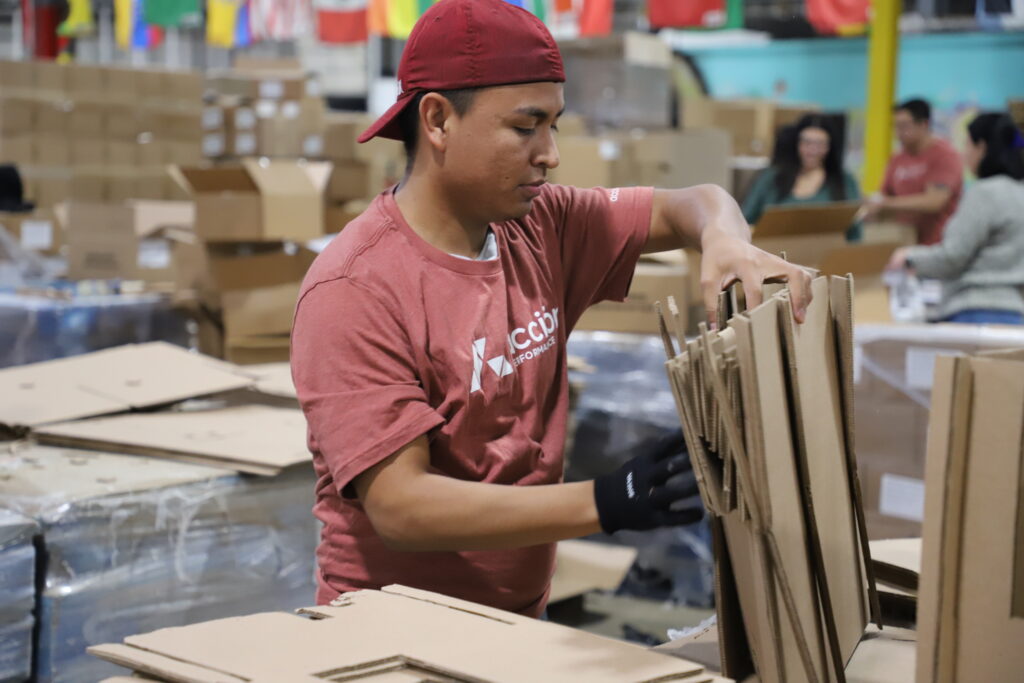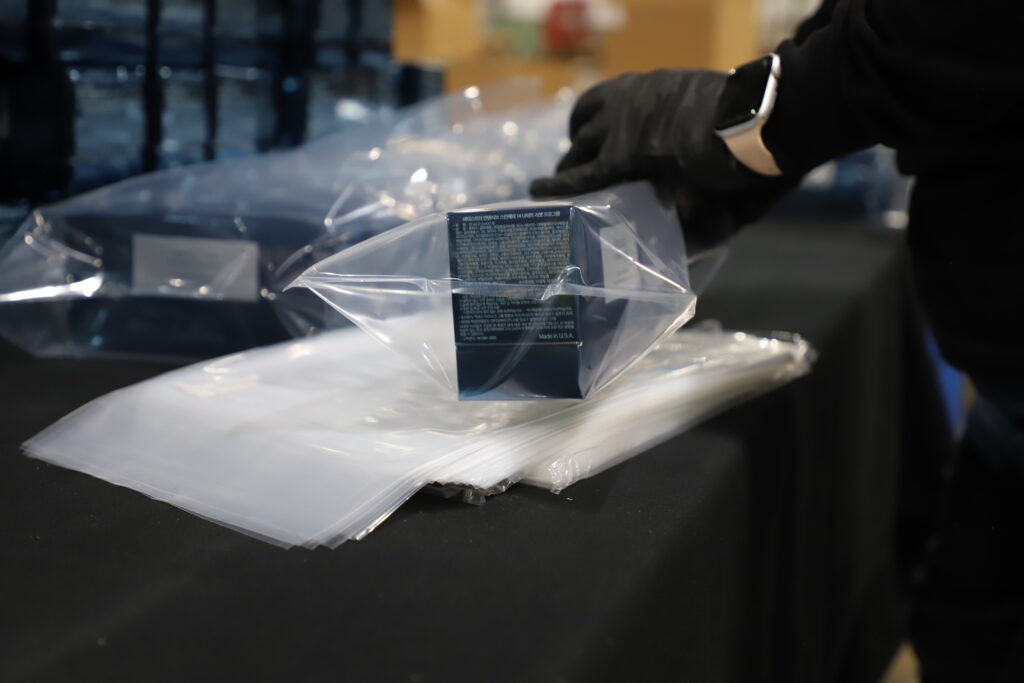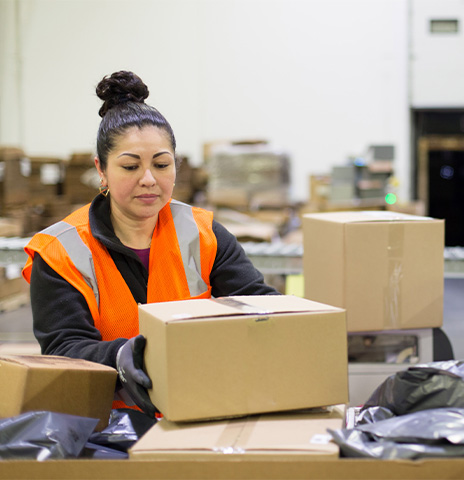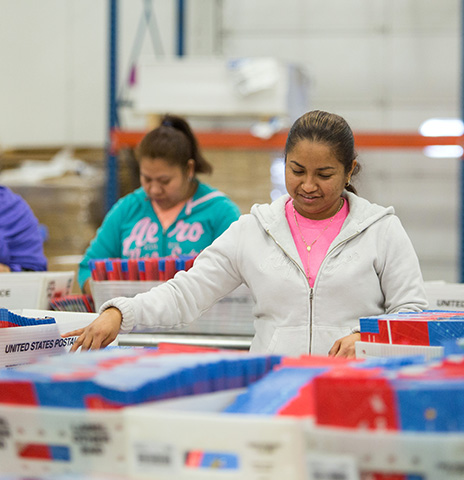Packaging Solutions
Stay on top of product alterations and capitalize on packaging as a marketing tool to your clients. Our team can focus on product appearance while ensuring safe and secure delivery to its destination.



Stay on top of product alterations and capitalize on packaging as a marketing tool to your clients. Our team can focus on product appearance while ensuring safe and secure delivery to its destination.



Reduce overhead costs and boost speed to market by shifting your assembly and co-manufacturing tasks to the Acción team. Our skilled team prioritizes quality and safety at every step.



Improve efficiency and maintain client satisfaction by outsourcing key fulfillment operations. Our team leads will manage processes from pick and pack all the way to returns.



Ensure your products are properly packaged and sent on time for Fulfillment by Amazon. Acción Performance prepares your items to fit necessary requirements, saving your team extra time and valuable resources.



Stay on top of product alterations and capitalize on packaging as a marketing tool to your clients. Our team can focus on product appearance while ensuring safe and secure delivery to its destination.



Reduce overhead costs and boost speed to market by shifting your assembly and co-manufacturing tasks to the Acción team. Our skilled team prioritizes quality and safety at every step.



Improve efficiency and maintain client satisfaction by outsourcing key fulfillment operations. Our team leads will manage processes from pick and pack all the way to returns.



Ensure your products are properly packaged and sent on time for Fulfillment by Amazon. Acción Performance prepares your items to fit necessary requirements, saving your team extra time and valuable resources.
Optimized supply chain solutions aren’t “one size fits all,” and neither are our pricing models. Our team
finds the best approach for your project to maximize your resources, including cost.








See how the Acción team creates individualized solutions for our clients across industries to optimize their unique demands.
The term “minority business enterprise” (MBE) is used to describe a small business that is owned and controlled by one or more persons who are members of an identifiable minority group, such as African Americans, Hispanic Americans, Asian Americans, Native Americans, American Indians, women, or persons with disabilities.
The U.S., Small Business Administration defines MBEs as businesses in which at least 51 per cent of the equity interest is held by one or more individuals belonging to an identifiable racial/ethnic minority group. The SBA also requires that at least 50 per cent of the employees be people from an identified racial/ethnic minority group, but it does not require that the owners be minorities.
The minority business development agency monitors this entity. This agency has been created by Congress and provides financial assistance to establish and grow minority-owned businesses. It was established in 1988 under Title III of the National Defense Authorization Act for Fiscal Year 1987.
A majority of the funds provided by this program are allocated to state agencies, local governments, and nonprofit organizations. These entities use these funds to provide technical assistance and training programs designed to hety entrepreneurs start their businesses. In addition, they may create partnerships with other organizations to assist them in developing new products and services.
When looking for a minority-owned business near you, there are several things to consider:
• What type of business do you want?
If you want to open your own business, you need to find out if there are any available spaces where you can set up shop. You will need to check whether zoning laws permit you to operate the kind of business you plan on starting. For example, many cities have restrictions regarding what types of companies can be located within specific areas.
If you want to work for someone else, you should look for companies specializing in providing goods and services to minority-owned businesses. Many of these firms hire workers based on referrals from existing clients.
• Where do you live?
You need to know where you live to determine how easy it will be for you to get started. If you live in an area with plenty of opportunities for minority-owned businesses, you might first want to explore those options.
• How much money do you have?
You must have enough money to cover initial startup costs, including rent, utilities, supplies, equipment, advertising, etc.
• Can you afford to lose some income while you build your business?
To succeed, you must be willing to take risks and put yourself through a learning experience. However, if you don’t have enough money saved up to support yourself during the early stages of your business, you could end up losing everything.
• Do you have a mentor?
Having a mentor can make all the difference in starting a successful business. A mentor can offer advice, guidance, and encouragement. They can also help you avoid making mistakes that could cost you time and money.
• Are you ready to commit to building your business?
Starting a business takes commitment, dedication, hard work, and lots of patience. You must be prepared to devote a lot of time and energy to your venture before seeing results.
• Is your idea unique?
Your product or service needs to be something others haven’t already offered. The best way to ensure that your business will be successful is to develop an innovative idea that no one else is suggesting.
• Does your idea fit in with the current trends?
Your idea must align with the latest trends. This means that you should research the market thoroughly to understand what people want and need.
Regardless of which option you choose, remember that the most important thing is to follow through. Don’t give up easily — keep trying until you find success!
For example, when finding a minority business enterprise in Indiana, you may want to start by checking local directories such as Yellow Pages, online resources, and other sources like the Small Business Administration (SBA).
Minority-owned business certification is essential because it shows potential customers that your company has gone beyond just another small business. It demonstrates that you’re serious about serving minorities and that you’ve done your homework.
There are several ways to obtain MBE certification:
1) Start a new business.
2) Expand an existing business.
3) Join a network of minority-owned businesses.
4) Work for an MBE-certified firm.
5) Become an MBE-certified contractor.
For example, Indiana DBE certification is available from the SBA. To qualify, your business must employ at least 51 percent minority employees. In addition, you must meet specific financial requirements and demonstrate that you have good management skills.
The SBA offers free assistance to small businesses seeking to become certified. For more information on how to apply for this program, visit www.sba.gov/mbe.
The SBA also provides training programs specifically for small businesses interested in becoming certified. These classes include marketing, finance, human resource development, and sales and customer relations.
It’s important to note that minority-owned business certification costs nothing. However, if you plan to expand your business, you’ll likely need to pay for additional services.
Indiana MBE application involves filling out a form that includes questions regarding your business. If you don’t know where to begin, we recommend contacting your local SBA office.
You’ll also need to provide proof of ownership, including copies of your identification documents. Finally, you’ll need to submit $25 per applicant for processing fees.
If you decide to join a network of minority-run firms, you can expect to pay membership dues. Some networks charge annual fees, while others offer monthly rates.
In either case, you’ll receive discounts on products and services. You can learn more about these organizations by visiting their websites.
The state of Indiana minority business certification is only one part of the puzzle. The next step is to identify the best way to promote your business.
Small Business Administration minority-owned business is a federal government agency that helps people start and grow their businesses.
It’s not necessary to be a U.S. citizen or resident to get help with starting a business.
However, some eligibility requirements do apply.
To qualify for SBA loans, you must be able to prove that you have been self-employed for at least three years.
To qualify for grants, you must show that a qualified minority business enterprise has employed you for at least two years.
Other than those two requirements, there are no other restrictions. Most states require you to register your business before applying for any loan or grant.
You may want to consider registering your business with the Secretary of State’s Office. This will allow you to file taxes online. It will also make it easier for potential customers to find your company.
Many states also offer tax incentives to encourage new companies to locate within their borders. Some states even provide unique financing options.
Finding a list of MBE-certified companies in Indiana can be difficult. This page lists several resources that you can use to find them.
First, check out the website of the Indiana DBE directory.
This site contains information on all types of businesses eligible for funding from the SBA.
Next, visit the Indiana Small Business Development Center.
Here you’ll find information on how to become an MBE certified business as well as DBE certification application Indiana.
Department of Transportation Disadvantaged Business Enterprise
While the SBA has a separate program for minority-owned businesses, many states have programs.
For example, the Department of Transportation (DOT) offers assistance to small businesses serving low-income populations.
These businesses include public transportation providers, airports, bus lines, railroads, and trucking companies.
They’re also open to businesses that work with local governments.
There are several ways to obtain minority-owned business certification.
One option is to contact your local city hall. They may provide you with a list of approved contractors.
Another option is to ask your local Chamber of Commerce. Many chambers of commerce maintain directories of minority-owned businesses.
Another good resource is the Internet. Many sites contain information on minority-owned businesses. One such site is www.
Finally, you can search the internet for “minority-owned business” and see what comes up.
How Do You Become a Certified Minority Woman-owned Business?
If you want to become a minority woman-owned business, you need to follow the same guidelines as a minority man-owned business.
The first step is to determine if you meet the criteria. The next step is to register your business with the appropriate state agency.
After that, you’ll need to apply for a certificate of eligibility. Finally, you’ll need to pay the fee required to receive your certification.
The mbe WBE certification application entails three steps:
1. Determine whether you qualify as a minority business enterprise.
2. Register your business with the appropriate government agencies.
3. Apply for a certificate of eligibility and pay the fee.
Step 1 – Is Your Company Eligible For Minority Business Enterprise Status?
You must first determine if your business qualifies as a minority business enterprise (MBE) to begin this process.
Step 2 – Register Your Business With Appropriate Government Agencies
Once you’ve determined that your company meets the requirements for a minority business enterprise, it’s time to register your business with various government agencies.
Step 3 – Obtain Certificate Of Eligibility And Pay Fee
You will then be issued a certificate of eligibility. This document certifies that your business is eligible to participate in federal and state programs designed to help minority businesses succeed.
In addition, you will need to pay an annual registration fee to continue receiving these benefits.